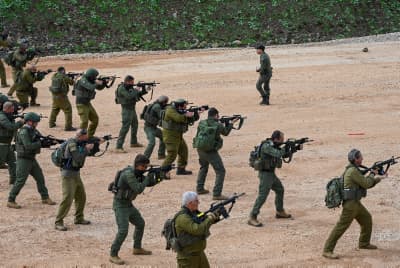Israel-Gaza War, Hamas
US officials: Israel can't achieve anything else in Gaza
Senior American officials believe Israel has reached the ceiling of its military effectiveness in Gaza, urging a shift towards diplomacy. As the conflict enters a critical phase, the focus turns to hostage negotiations and the uncertain future of Hamas's control in the region.

Senior American officials believe Israel has achieved all it can militarily in Gaza, according to recent assessments. These officials argue that continued bombings are increasing risks to civilians while the possibility of further weakening Hamas has diminished significantly.
The Biden administration is now racing to revive cease-fire negotiations, with a growing consensus among national security officials that while the Israeli military has severely set back Hamas, complete elimination of the group is unlikely.
Military Achievements and Limitations
Israel's military operation has far exceeded initial U.S. predictions. Israeli forces now move freely throughout Gaza, and Hamas is significantly weakened. The Israeli military claims to have killed or captured about 14,000 combatants in Gaza, though U.S. intelligence agencies use more conservative methodologies to estimate casualties.
Notable achievements include the elimination of half the leadership of the Qassam Brigades, Hamas's military wing, including top leaders Muhammad Deif and Marwan Issa. Israel has also destroyed or seized crucial supply routes from Egypt into Gaza.
However, one of Israel's primary goals – the return of approximately 115 living and dead hostages still held in Gaza – remains elusive. Current and former American and Israeli officials agree this objective cannot be achieved through military means alone.
Diplomatic Efforts Intensify
As the military campaign reaches its limits, diplomatic efforts are ramping up:
- CIA Director William J. Burns is scheduled to visit Qatar on Thursday.
- Brett McGurk, President Biden's Middle East coordinator, has traveled to Egypt and Qatar.
- Amos Hochstein, a senior White House adviser, has arrived in Lebanon.
These officials are expected to convey the message that Israel has little more to gain militarily against Hamas.
Internal Israeli Disagreements
Tensions within Prime Minister Benjamin Netanyahu's government have surfaced publicly. Defense Minister Yoav Gallant reportedly questioned Netanyahu's goal of a "total victory" over Hamas in a closed-door meeting. This view aligns with that of U.S. Defense Secretary Lloyd J. Austin III and other Biden administration officials, who believe a cease-fire agreement that returns the hostages is in Israel's best interest.
Challenges in Gaza
Israel's recent military operations have been described by American analysts as a "Whac-a-Mole" strategy, targeting potential regroupings of Hamas fighters. However, U.S. officials are skeptical this approach will yield decisive results.
Hamas has adapted by urging its fighters to hide in Gaza's vast tunnel network or among civilians. While Israel has damaged some tunnels, the network has proved more extensive than anticipated and remains an effective means for Hamas to conceal its leaders and move fighters.
Looking Ahead
U.S. officials believe that Hamas, while significantly weakened, retains some military strength. The group is no longer capable of planning or executing an attack on the scale of October 7, but its ability to launch smaller terrorist attacks on Israel remains uncertain.
Diplomatically, Hamas has indicated to international negotiators its willingness to cede civilian control of Gaza to an independent group after a cease-fire. The longevity of this arrangement will depend on post-cease-fire developments and Israel's concessions.
As the situation evolves, the biggest unknown for both Israel and the Palestinians is what comes after Hamas.
American and other Western officials stress the importance of a meaningful pathway to an independent Palestinian state as a crucial incentive for maintaining stability post-cease-fire.
The coming weeks will be critical as diplomatic efforts intensify to secure a lasting cease-fire and address the complex political landscape in the region.
* The New York Times contributed to this article.